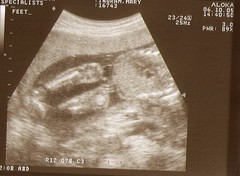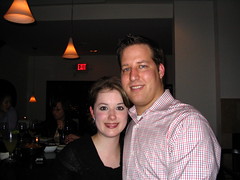Sorry it's been so quiet here lately. Stephen is chaplain at Camp Calvin right now and I'm deep in Summer School and work at Emory. Here's the sermon I preached today in my summer school class. The text was Psalm 119:105-112. It was my first attempt at preaching a Psalm or Wisdom Lit. Feedback is always appreciated. Enjoy!
Adam Our text today often gets a bad wrap because of its setup. Psalm 119 is by far the longest Psalm in the Bible. Each group of verses in the Psalm is eight lines of Hebrew all beginning with the same letter of the Hebrew alphabet. Aleph, Bet, Gimel, Dalet… You get the idea and that’s about as much Hebrew as I remember. Our verses today are in the Nun section. I wonder how many people when reading this Psalm even make it this far. We’re over 100 verses into the Psalm and you still have another 67 to go. When reading the text in English this setup can feel very arbitrary and even when the original author’s style is explained the Psalm can still feel forced.
The Psalm itself falls into the category of a wisdom Psalm. There is no superscription attributing it to any author or tradition. Given its place in the Psalter, our text was most likely written and preserved during the post-exilic period when Jews were allowed to return to their land under the reign of a Persian King. We know that this Psalm was used in worship during Pentecost, 50 days after Passover, celebrating the giving of the law to Moses on Mount Sinai. There is no indication in the text that the Hebrews were required to wear red and pretend to speak in tongues that day. Surely the Hebrews had to find this Psalm as long winded and arbitrarily styled as we do today. The Hebrews, being good Christians even before there were good Christians, must have preferred spontaneous, contemporary worship rather than this stilted, laborious move through the Hebrew alphabet. Obviously I’m overstating the case here. This is Holy Scripture preserved by the Hebrews and read on an important day in their history. As I read our text today, I’d like to submit that we are being allowed a glimpse into a sort of Lectio Divina for the Hebrew People. The nature and setup of the Psalm allows each part to be easily remembered so that the text becomes ingrained in one’s soul, enchants the imagination, and creates a framework in which the spirit of God moves as the text becomes part of one’s very being. Let’s listen together now to Psalm 119:105-112.
Your word is a lamp to my feet and a light to my path.
I have sworn an oath and confirmed it, to observe your righteous ordinances.
I am severely afflicted; give me my life, O LORD, according to your word.
Accept my offerings of praise, O LORD, and teach me your ordinances.
I hold my life in my hand continually, but I do not forget your law.
The wicked have laid a snare for me, but I do not stray from your precepts.
Your decrees are my heritage forever; they are the joy of my heart.
I incline my heart to perform your statutes forever, to the end.
There are lots of great Old Testament words that sound very preachy from the pulpit in this text. Words like law, oath, ordinances, decrees and statutes. Honestly all of these sound very scary to me. They conjure up the image of the Old Testament God standing among the clouds of heaven with a lightning bolt in hand ready to smite all those who need a good smoting. I want to spend some time today unpacking what all these words mean for us today.
Verse 105 states that God’s word is a lamp unto the Psalmists’ feet and a light to the path. Word shows up again in verse 107 as the Psalmist demands life according to God’s word even as he is severely afflicted. In the Hebrew world, “Word” means the words of the prophets. The Psalmist is stating that the words of the prophets are the guide for his life and then the Psalmist demands life according to the words God has spoken trough the prophets. But just what words did the prophets speak? They of course were known for calling Israel back to repentance each time Israel strayed from the path of Godly living. You have your social justice prophets like Micah and Amos that cry out on behalf of the poor and oppressed. You have your prophets who changed the way the people worshiped God during the exile like Jeremiah. There are really longwinded prophets like Isaiah and your really weird prophets like Ezekiel. Love them all or hate them all they offered words of wisdom for the Hebrew people. So understand that when this text encourages us to live by the word of God, it is referring to more than words of scripture. It is encouraging us to listen to the voices of prophets throughout scripture, history, and even today. So study a contemporary prophet like a Jim Wallis or Mother Teresa with the same open spirit with which one studies the Isaiah’s and Micah’s of the Bible. The word of God is an ongoing thing in our lives. The prophetic voices are still all around us. We just need to listen to them.
And now to the words like ordinances, decrees, and statutes. Again I don’t know how much meaning those types of words carry for us today. They seem like archaic legal jargon that no one uses in every day conversation. But in the Hebrew world these words in our text referred to requirements and prohibitions found in the book of Exodus. The most famous of these requirements and prohibitions is of course the Ten Commandments given to Moses on Mount Sinai, the very moment the Hebrew people commemorate by reading this Psalm. We all think we know the Ten Commandments. Have no other Gods before our God, don’t worship idols, don’t take the name of the Lord in vain, remember the Sabbath, honor your father and mother, don’t murder, don’t commit adultery, don’t steal…. I confess from here on out I had to look up the rest of the commandments, but 8 out of 10 isn’t bad. Don’t bear false witness against your neighbor and don’t covet anything in your neighbor’s house. All of these seem to us to be great ideals that we try really, really hard to live by. Don’t murder and don’t steal are usually pretty easy for most of us, but lots of us work on Sunday or cause some poor waiter at the restaurant to have to. And who doesn’t occasionally glance with envy at the neighbor’s new car parked in the next drive over from our beat up old hunk of junk. Yet we confess these shortcomings as soon as we become aware of them we promise we’ll try even harder to live by. But all the effort in the world misses the point of these commandments, decrees, ordinances, and statutes. These are absolute requirements and prohibitions. God gave these to Moses on Mount Sinai with the understanding that the people of God simply do not do these things. These are not suggestions or ideals. If we are the people of God, these are the things we do not do under any circumstances. Think about that next time you growl at the barista who’s making you late for church because he or she is slower than usual with your customary Sunday morning Starbucks double shot half caf skinny mocha latte.
Finally there is the misunderstood word law in verse 109 of our text. Whether we mean to our not we understand laws more in the modern context of speed limits or rules prohibiting us from buying beer on Sunday. But law in this case was Torah. All the teachings and instruction of Moses. The Ten Commandments would be included in this. The History of the people of Israel, humankind’s expulsion from paradise, the deliverance of the Hebrews from the hand of Pharaoh, right to the moment the Israelites were about to enter the Promise Land is tied up in the Torah. This was more than just Law, this was their entire identity as the people of God. The Psalmist does not forget his identity as a Hebrew in covenant with God, even as he holds his life in his hand and is afflicted from all sides. I would contend that we today must continue to remember that we are still Sons and Daughters of the same God that delivered the Psalmist and the rest of the Hebrews from exile back to the promise land. We must claim the Torah as our story as well. We must claim our identity as citizens of the Kingdom of God and continually announce that a new age is upon us. We must recognize the ongoing story of God’s redemption of the world. We know that the story of God’s redemption did not end with the return to the Promise Land of Israel. Even the Psalmist knows this as the author declares in verse 111 that the Lord’s decrees are our heritage forever. This is a semi-revolutionary statement considering how much of the Hebrews’ identity is tied up in the idea of a Promise Land. The Psalmist is declaring that God’s Word, God’s Prophets, God’s Prohibitions and Requirements, God’s story of his relationship with the Hebrews is of equal if not greater importance than the land the Hebrew people believe will someday be theirs to rule over.
Most importantly, don’t miss the great irony of the text. The Psalmist is claiming all of this despite affliction, danger, and the wicked that surround the author. Somewhere along the line we’ve confused God’s will with a path of ease and safety. In our world, a dead end or affliction or living perilously or trouble with the wicked must mean that we were never truly in God’s will to begin with. This certainly was the mindset of many of the Hebrew people. The book of Deuteronomy and many subsequent Hebrew texts follow that logic. I think our text today combats that idea. And that’s the tension we have to live with today. Are we willing to claim our heritage as the people of God even when things don’t seem to be going our way? I think this Psalm encourages us to claim our identity even in the midst of our afflictions. This Psalm understands that God’s path is not always the easy path. Even among our afflictions and shortcomings we cannot be afraid to claim the prophets both ancient and modern, the teachings and requirements and prohibitions and the ongoing story of God and God’s people, and we claim them not just as things of value, but as central to our very identity as the People of God. Amen?





